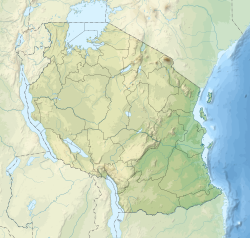Mkia wa Ng'ombe Ruins (Magofu ya mji wa Kale wa Mkia wa Ng'ombe in Swahili ) is protected historic site located inside Micheweni District of Pemba North Region in Tanzania. The settlement was established around the 15th CE and abandoned in the 16th century. There are ruins of a mosque, tombs and some stone buildings. The site is critically endangered to further erosion.[2][3][4][5][6]
| Location | Micheweni District, Pemba North Region, |
|---|---|
| Coordinates | 4°57′6.84″S 39°41′16.08″E / 4.9519000°S 39.6878000°E |
| Type | Settlement |
| History | |
| Material | Coral rag |
| Founded | 12th century CE |
| Abandoned | 15th century CE |
| Cultures | Swahili |
| Site notes | |
| Condition | Endangered |
| Ownership | Tanzanian Government |
| Management | Antiquities Division, Ministry of Natural Resources and Tourism [1] |
| Architecture | |
| Architectural styles | Swahili & Islamic |
| Official name | Mkia wa Ng'ombe Ruins Historic Site |
| Type | Cultural |
See also
editReferences
edit- ^ "Antiquities Division". Retrieved 21 Jul 2022.
- ^ Spear, Thomas (2000). "Early Swahili History Reconsidered". The International Journal of African Historical Studies. 33 (2): 257–290. doi:10.2307/220649. JSTOR 220649.
- ^ Kessy, Emmanuel T. (August 1992). The economic basis and the location of same 'iron age' settlement on pemba and zanzibar (Thesis).
- ^ Zhao, Bing (2012). "Global Trade and Swahili Cosmopolitan Material Culture: Chinese-Style Ceramic Shards from Sanje ya Kati and Songo Mnara (Kilwa, Tanzania)". Journal of World History. 23 (1): 41–85. doi:10.1353/jwh.2012.0018. JSTOR 41508051. S2CID 144646037. Project MUSE 479014.
- ^ Fleisher, Jeffrey B. (2010). "Swahili Synoecism: Rural Settlements and Town Formation on the Central East African Coast, A.D. 750–1500". Journal of Field Archaeology. 35 (3): 265–282. doi:10.1179/009346910X12707321358919. JSTOR 24406708. S2CID 140142071.
- ^ Ingrams, W. H. (1967). Zanzibar: Its History and Its People. Psychology Press. ISBN 978-0-7146-1102-0. JSTOR al.ch.document.puhc025.
